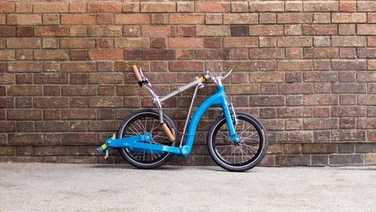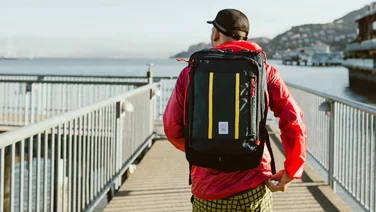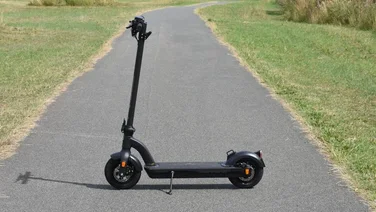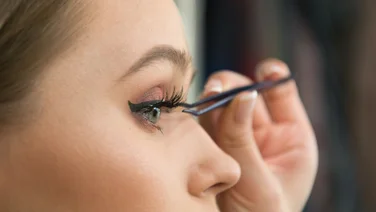To help us provide you with free impartial advice, we may earn a commission if you buy through links on our site. Learn more
- How much should I pack?
- What about luggage?
- How much should I spend?
- What if I can’t get everything I need before travelling?
- Essential items to pack for travelling
- 1. Appropriate clothing
- 2. Portable charger
- 3. Medicines and vitamins
- 4. A first-aid kit
- 5. A reusable water bottle
- 6. Skin protectors such as sunscreen and bug repellent

We’ve all been there: suitcases open on the floor, clothes strewn everywhere, while you look for that pair of swimming goggles from a holiday six years ago. You may have booked yourself a relaxing break, but the preparation can be anything but. What do you need to take? How much is too much underwear? And will any of this fit in my suitcase anyway?
So, to help make the process easier, we’ve created a list of the absolutely essential items to pack when travelling, whether you’re prepping for your annual summer getaway or heading on a backpacking trip across South America.
Of course, there will be holiday-specific items, such as a swimming costume for a beach holiday, or a decent camera if you’re going on safari – but our list highlights the items you will generally expect to need, no matter the type of travel you’re doing.
How much should I pack?
This will largely depend on the length of time you’re away. You should consider the number of days you’re travelling and what you’ll need day-to-day, in terms of clothes, toiletries and correct currency.However, there are definitely some items – underwear and socks, for example – that you’ll want to pack more of. If you’re going somewhere where the weather is particularly wet or hot, for instance, where clothes are more likely to become soiled or smelly, then you’ll be pleased you packed some extra sets.
You may also want to consider taking some extra cash in case of emergencies, as well as extra suncream, medicines or insect repellent to avoid having to buy at potentially higher prices.
READ NEXT: Best suitcases
What about luggage?
Types and size of luggage varies; but again, start by considering the length of your trip. You should also take into account the mode of travel – plane, train, coach or boat – since each will have different regulations about how much luggage you can bring on board.
Most airlines allow one bag of a certain size on the plane with you; additional payment may entitle you to travel with an extra, larger bag to go in the overhead compartment or hold luggage. If you’re travelling by train then National Rail services usually allow up to three items of luggage on their journeys, providing you are able to handle it yourself – this varies from company to company, mind. Other methods of transport, such as coaches, may be limited in space, so expect to have to travel light.
The takeaway with luggage is to always double-check your luggage entitlement with the company with whom you’re travelling, and ensure you have identifying information attached to the bags you take, in case anything is misplaced en route.
READ NEXT: Best hand luggage
How much should I spend?
There’s no need to spend a fortune on travel supplies; much of what you need – such as toiletries, headphones and so on – you’re likely to already own. Having said that, if you are buying new items such as a backpack or suitcase, then it may be worth spending some extra money to pick up quality products that will survive beyond just a single trip. Opting for cheap may result in damaged items that will need replacing.
What if I can’t get everything I need before travelling?
Don’t worry. If you’re travelling from an airport, duty-free shopping is likely to see you find everything you’ll need while away, from travel shampoo and body wash, to headphones and city guides, which you can pick up while you’re waiting for your gate number to appear on the board. Whether it will be cheaper than buying ahead of time is up for debate; but an option in an emergency.
At the other end of your journey, and with the correct currency in hand, you may be able to buy any items you need at your destination. Plenty of locations, especially tourist areas, will have shops where you can pick up travel essentials – even if you might not find a specific brand or cream or toothpaste, for example.
READ NEXT: Best backpacks
Essential items to pack for travelling
1. Appropriate clothing
Of course, you’ll be packing clean clothes for daily wear on your trip; but when we say “appropriate”, we’re highlighting items that take into account the local climate in the place you’re heading to, and the activities you’ll be taking part in – which you may need to buy ahead of time.
For example, items such as hiking boots if you’re trekking; waterproof jackets or thermal base layers to combat cold weather; or a pair of decent flip flops for use on a beach or beside the pool. Source and buy such items well before your departure date to ensure you have the correct size and style that works for you.
2. Portable charger
It can be frustrating being out and about and seeing your battery life start to dwindle at the best of times; but when travelling, your devices can become essential for things such as translating phrases or finding your way back to your hotel room. As such, it’s important to top them up as you go, and the best way to do that is with a portable charger or power bank.

Finding the best power bank is about ensuring you have the right capacity for the devices you need to charge. Avoid power banks below 5,000mAh, since this is the minimum capacity required to charge just an average smartphone. Instead, opting for a higher-capacity power bank that offers the ability to fast-charge will see you able to top up both your phone and a tablet, for example, at speed.
Higher end power banks usually cost around £30, but you don’t need to spend big in order to pick up a decent quality item. In addition, cost shouldn’t always be the only consideration; for travel, factors such as size and weight are important, as well whether wireless charging might actually be a better option for you.
3. Medicines and vitamins
If you’re taking medication for a condition, or supplements on a regular basis, then of course you should pack them so you can continue to do so over the time you’re away. These capsules from Cadence and these simple clear bottles from Amazon prove handy vessels for easily packing any medicine to take with you around the world.
However, also essential are painkillers such as paracetamol or Nurofen, which can provide fast relief if you happen to find yourself unable to enjoy your holiday because you’re not feeling 100%.
4. A first-aid kit
Having a first-aid kit to hand in any situation is a good idea, but especially if you’re travelling and are unsure about where/if you’ll have access to medical care. A kit such as this one on Amazon includes everything you need to treat minor injuries and accidents, containing basics such as plasters, cleansing wipes and bandages, as well as antiseptic creams and antihistamine tablets. In an emergency situation, these can prove essential to ensuring your wellbeing on a trip.
Having said that, a first-aid kit can only go so far, and any injuries that require more than surface-level treatment should be attended to by a trained medical professional. As such, do your research and ensure you’re aware of where you can find medical support during your travels.
5. A reusable water bottle
Water is one of the body’s most important fuel sources, with the recommendation that we drink between 6 to 8 cups of fluid a day. When travelling, this advice can take a back seat to everything else you’re doing. To avoid becoming dehydrated – in warmer climes, in particular – it’s important to keep topped up.
The simplest way to ensure you hydrate is to carry your water with you. A reusable water bottle will not only mean you always have water with you, but you’ll be able to top it up as it starts to deplete without having to splash the cash. Just make sure that the tap water is safe to drink, because different countries have different levels of sanitation.

In London, for example, you can fill up your water bottle in various locations around the city, with most establishments in cities and towns in the UK topping up your water bottle with tap water for free. A similar scheme is in place in Paris, while you’ll find numerous drinking fountains around Rome.
A reusable water bottle is both convenient and better for the environment, so taking one on your trip would not be a waste of space.
6. Skin protectors such as sunscreen and bug repellent
Your skin can go through a lot of trials and tribulations when travelling. So, when you find yourself in a new environment, protection should be a priority – and the main factors you need to guard against when you’re on your travels are the sun and pesky bugs.
Pack a sunscreen to protect against UVA and UVB rays, reducing the risk of sunburn in hotter climes and guarding the overall health of your skin over the long term. And if you’re someone who finds that mosquitoes just can’t get enough of you, then a bug repellent will avoid you being bitten and subsequently scratching yourself to death. In some countries, insect bites can be dangerous to your health, so again, some research before travelling will help you determine whether you need extra protection in the form of immunisations or preventative medication.






